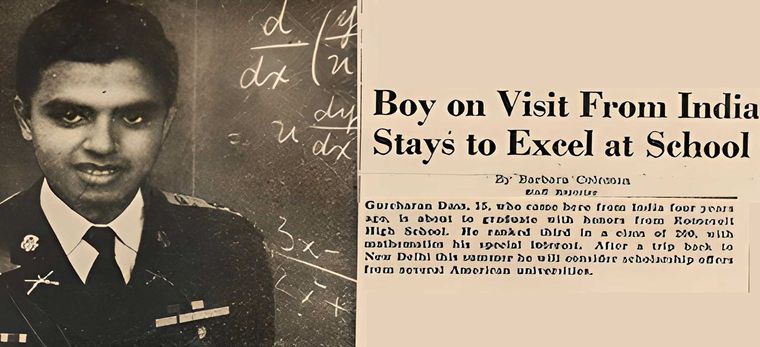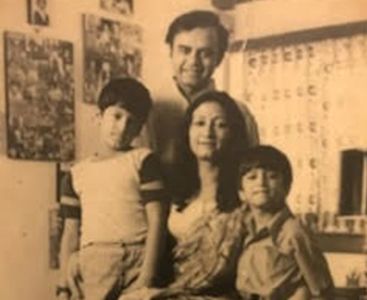Gurcharan Das was just a boy when his family first arrived in America. Eisenhower was in the White House, and race politics was on the boil. Das felt the heat soon after he enrolled in a school in Washington, DC. A white girl invited him to her birthday party, where after a grand meal, the children played Spin the Bottle. The game involved a player spinning the bottle, and when it stopped, kissing the person of the opposite sex that the bottle was pointing to. An unwritten rule: black boys kissed only black girls, and white boys kissed only white girls.
So there was much confusion when it was Das’s turn. “I solved the problem brilliantly―I kissed everybody,” Das tells THE WEEK. “If there was a black girl on the other side, I would kiss her. If it was a white girl, I would kiss her. And I kept getting bonus points as a result of that. I just kept on kissing.”
It is a Zoom meeting, and Das, now 80, is in his home in Delhi having soup and sandwich as he talks about his new book, Another Sort of Freedom. It is a charming memoir that intimately describes the twists and turns in his extraordinary journey―his happy childhood in a prospering family in Lyallpur in pre-partition Punjab, the “temporary insanity” of the partition that left deep wounds, the healing in independent India, the World Bank’s brokering of a water sharing treaty between India and Pakistan that had his family moving to America (his father was part of a team of engineers that negotiated the deal), the American experiences that would forever change his outlook on life, his return to India to earn a formal livelihood, the weekday struggle to climb the corporate ladder and the weekend dabbles in the literary world, rising to become the legendary CEO of Procter & Gamble India, taking early retirement to become a full-time writer…. In the memoir, Das is both the spinning bottle and the beneficiary of liberal kisses from good fortune.
He describes it as laghima. A Sanskrit word, laghima connotes the experience of living lightly―“not like a feather, but like a bird”. Laghima had stood Das in good stead at Harvard, where he switched subjects as he pleased in his first year, learning from titans and drinking from several fountains of knowledge. He took classes in molecular biology from James Watson, who would go on to win the Nobel for proposing the DNA’s double-helix structure; he learnt moral and political philosophy from John Rawls, author of the seminal Theory of Justice; the economist-diplomat J.K. Galbraith had him appreciating Nehruvian socialism, while pre-fame Henry Kissinger had him questioning Nehru’s foreign policy.
He also learnt from Edward Said that a Hindu from a Punjabi middle-class family that had risen professionally in British colonial society, such as Das, had much in common with a Palestinian scholar from a rich Christian business family in Egypt, such as Said. They were both “deracinated exiles”, Said told him, and they were trying to cope with their post-colonial identity. “He insisted that I must return to India after Harvard and free my countrymen from the mental fetters of colonialism,” writes Das.
As it happened, he took only half the advice. After graduating from Harvard with a degree in philosophy, Das returned to India and joined a company that made Vicks VapoRub.
It was a somewhat forced decision. After returning to India, Das had been living by the French aristocracy’s belief that idleness is the natural state of human beings, but his quintessentially Indian mother began losing patience. Being jobless is the result of too much philosophy, she said. Laghima again came to Das’s rescue. He found happiness in the form of a rotating chair in his new office in a run-down Victorian building in Bombay. “I sat in it, and I went round and round, and it cheered me up,” he says.
Good cheer wafts through Another Sort of Freedom. Das’s narration marries wit and contemplation―he not just pokes fun at himself (“I just take my work, and not myself, seriously,” he explains), but also takes a warts-and-all look at the person he has evolved into. With equal passion, he writes about being an awkward boy who accidentally encounters the naked bottom of an attractive cousin (“…the memory of a gentle light falling on her beautiful, light-brown, naked bottom persisted for years”) and being a worldly-wise philosopher-CEO caught in the stifling bureaucracy of India’s Licence Raj era (“The joint secretary was ready to kill anything that breathed of spontaneity or human achievement”).
“I think my wife would have been happier if I had not written the book at all,” says Das, “because she is a bit embarrassed that I am sort of a semi-public person.”
There is a lot in the book that would make fans of aphorisms happy. Early in his career, Das writes, “I found there were two kinds of people: those who did the work and those who took the credit. There was lots of competition in the second group, very little in the first.” Politeness, he discovers, is the best form of hypocrisy. As a mid-level manager, he finds out that “when power and incompetence meet, disaster is not far behind”. The difference between Delhi and Bombay? “Delhi had one CEO; Bombay had 1,00,000.”
Another Sort of Freedom is the fourth in a series of Das’s meditations on moksha and the various forms of liberation associated with it. In the widely acclaimed India Unbound (2000), he had delved into India’s economic liberalisation and its search for material well-being; The Difficulty of Being Good (2009) was a Mahabharat-inspired inquiry into moral liberation; and Kama: The Riddle of Desire (2018) was about attaining the goal of desire and pleasure.
With this intimate memoir, Das says, he has not just completed a moksha quartet, but also come to grasp a personal truth. He now thinks of himself “not as a horse without a harness,” he says, “but as a ‘horse easy in its harness’, as Robert Frost puts it.”
Surely, it is the best sort of freedom one could hope for.




